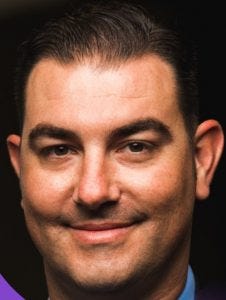Build, Buy or Broker? Channel Partners Tackle Evolving Technological Demands
Two partners, two different approaches to growth.

How do partners provide a single “throat to choke” in an age of expanding and ever-complexifying business technology needs? Or is that even possible?
 IT, telecom and print existed as separate industries for a half-century, but their lines have blurred in recent decades. And although partners have fiercely debated if convergence will occur, the answer is clear.
IT, telecom and print existed as separate industries for a half-century, but their lines have blurred in recent decades. And although partners have fiercely debated if convergence will occur, the answer is clear.

TBI’s Mike Onystok
“It’s converged; it’s happened,” said Mike Onystok, TBI’s senior vice president of operations. Onystok, who comes from the traditional telecom services brokerage side of the channel, said traditionally, IT-focused partners have been selling through TBI for a long time. But he does see an influx of these partners adding carrier services and connectivity-oriented technology to their portfolios.
“VARs and MSPs more than ever are coming to our portion of the channel and leveraging carrier services, unified communications, security and other technologies to better fit their customers with the right solutions,” he said.
But how does a partner evolve their practice to deliver offerings they’ve never delivered before? Channel Futures asked two partners about their journeys in convergence.
Partner 1: Investments Pays Off
Marco Technologies holds a spot on the 2021 MSP 501 list as one of the world’s most successful managed IT providers. However, the company offers more than managed IT and hasn’t always offered managed IT. Matt Kanaskie, Marco’s vice president of sales, said his company has been participating in convergence for a long time. All the way back to the 1970s, in fact.

Marco Technologies’ Matt Kanaskie
Marco’s founders actually started it as a typewriter company back in the 1970s. The company sold office furniture and supplies out of retail locations. Then the world of technology evolved, and Marco evolved alongside it. First, typewriters went digital, and then copiers started connecting to networks. As a result, Marco started a data networking and infrastructure practice.
Evolution continued. Marco adopted VoIP and expanded into audio/visual. The company built a manage IT services practice. It acquired a technology consultancy and entered the traditional connectivity agent channel. Kanaskie joined the company six years ago to start the company’s cloud voice practice. Most recently, the company has been investing in its security play.
Throw out a partner moniker, and Marco probably fits the description. MSP, MSSP, VAR, system integrator, telecom agent, copier dealer; Marco does it.
“Once something became IP-connected and became a challenge for the IT department, we expanded services into that practice,” Kanaskie said.
Drivers
Kanaskie said Marco expanded not just to provide new technologies, but to provide different ways for customers to consume the technologies. Some customers just want the partner to sell them the solution. Others want it designed. Others want implementation or management. Consider that Marco was already brokering voice services when Kanaskie launched the company’s cloud voice practice
“As opposed to saying, ‘Hey let’s go broker it,’ we built it. But we also broker too,” Kanaskie said. “There are so many options and niche fits, that if you’re going to be a consultant to the end user client, you need to represent what’s available to them in the market, not just what you’re trying to shove down their throat.”
While Marco has built new practices to corner new market opportunities, the changes often stem from customer requests. For example, the company bought a telecom agent after customers asked for them connectivity consulting.
“Clients were going, ‘Hey can you take over this telecom stuff? You’re already doing my phone system. You’re already doing my firewall. Can you help me with the Comcast stuff?'” Kanaskie said.
But what’s the end goal of adopting new practices? Is it simply to stay sticky with existing customers?
Kanaskie said the opportunity encompassed much more than that.
“It opened up an opportunity for cross-selling our expanding wallet share. The momentum was growing inevitably. There was no reason not to do it other than the strain on the financials,” he said.
The Challenge
And it was a strain indeed. Kanaskie said Marco’s IT division took years to reach profitability.
“It took a steadfast commitment, knowing that the market would come,” he said.
He said Marco struggled most to …… figure how to sell at scale and fine-tune its sales motion to overcome the cost.
It also needed to rethink its personnel. First, the company realigned existing workers. Marco removed some of its top sellers from the field and put them in support roles focused on design and implementation.
Moreover, Marco needed to bring on new people with unique skill sets. The company has been doing just that as it develops its security practice. The company hired a security architect, a security analyst, a CISO and a compliance and auditing team.
“You have to have a different set of talented individuals scoping and designing and selling solutions,” Kanaskie said. “… the copier technician is not managing a server.”
Partner 2: Pick Your Battles and Partners
CentraComm has taken a decidedly different approach. The Ohio-based company started as an internet service provider in a small town two decades ago. Several large enterprises operated out of the town, but the area lacked the internet coverage required to fuel the growing economy. CentraComm stepped in to meet the need.
Eventually, other internet services popped up in town and CentraComm moved its focus elsewhere. It now owns and operates its own data center and provides managed IT and network services. The company deals in three main areas: traditional hardware and software renewal; an emerging technology division that leverages a Zscaler partnership; and providing security remediation and assessment to manufacturers that supply the Department of Defense.

CentraComm’s Brian Coppus
CentraComm launched the security practice three years ago. It brought on new staff – including a Ph.D. – to provide those services. Brian Coppus, the company’s director of sales and marketing, says building a security practice has required significant investment and education.
Much like Marco’s IT division that took time to develop, CentraComm’s security practice has required a patient approach. He said next-generation security solutions in some respects remind him of where cloud was 10 years ago. People are talking about it, but they aren’t necessarily adopting it.
“You’re waiting for that evolution and those people to embrace that zero-trust model. All that stuff takes time,” Coppus told Channel Futures.
Although Marco and CentraComm both have created a securities practice, only the former is an MSSP. CentraComm provides risk mitigation and gap analysis, helping customers assess and improve their security posture. However, it doesn’t own a security operations center. Instead, it partners with companies that offer SOC as a service.
That’s one of the reasons CentraComm signed up with TBI. CentraComm turns to the service distributor’s supplier contracts when customers ask for help connecting a new location, finding a new SIP provider or any other area where CentraComm lacks the technical expertise.
“People are your biggest cost,” Coppus said. “You have to have more and more engineers and people to deliver all those products and services. For us, it’s easier for us to work with other partners that can deliver the services we can’t deliver if customers want to still have that throat to choke.”
Coppus said CentraComm has succeeded by focusing on …
… its three strengths and finding partners with complementary technology strengths.
“There is plenty of business out there for everybody. For the people that are trying to be everything to everyone, it’s a very difficult model,” he said.
Coopetition
Marco Technologies’ journey in the channel took an interesting turn in 2020 when it started its own indirect channel. TBI signed the company to its supplier line card. As a result, TBI agents can broker Marco’s managed IT and security services for their clients.
It’s a reminder to Kanaskie that channel relationships always teeter “on the edge of partnership and competition.”
“Everyone’s got a little bit of a hand in the cookie jar,” he said.
Kanaskie remembers when Konica Minolta, whose copiers Marco resells, bought MSP All Covered in 2010. Marco’s manufacturer was creating an IT services practice at the same time Marco was starting one.
Did that complicate the relationship? Sure, but Kanaskie now sees the overlap as a normal dynamic of the channel.
“It’s so pervasive in this industry. It’s inevitable that we cross paths or step on each other’s toes or have overlap in something. And it’s almost impossible for us to partner with someone that doesn’t compete with us somewhere else.”
Look Beyond
Kanaskie notes that IT and telecom are not the only industries that are coming together. The imaging channel, which includes Konica Minolta and other print vendors, has been adding IT services.
Traditional telecom agents don’t seem to realize this, Kanaskie said.
“But this convergence is about to wake them up,” he said. “A traditional telecom seller [says], ‘I’m going to go sell managed IT with security,’ and then they [say], ‘Wait, I’m up against Konica Minolta, the copier company? And they’ve been doing it longer than me?'”
And the convergence might touch yet another industry. Kanaskie said the business world might start demanding solutions around cryptocurrency and blockchain.
“It’s going to be another set of experts joining the technology discussions,” he said.
The evolution never stops.
About the Author
You May Also Like


